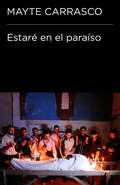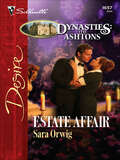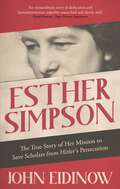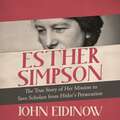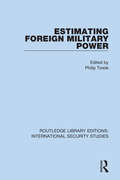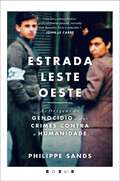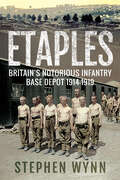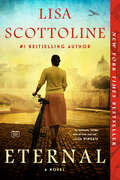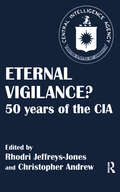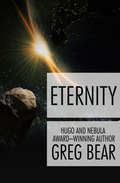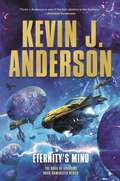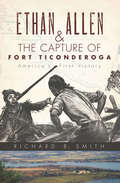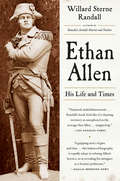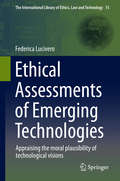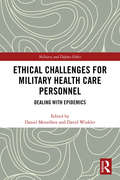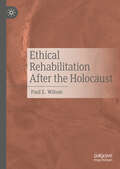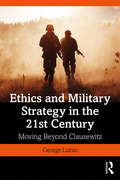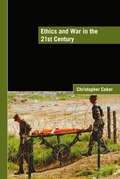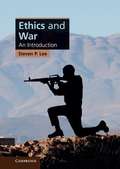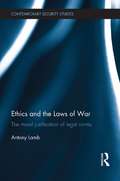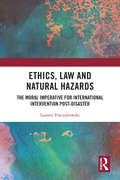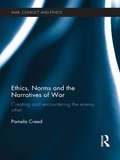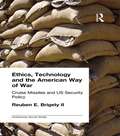- Table View
- List View
Estaré en el paraíso (Colección Endebate #Volumen)
by Mayte CarrascoUna cuidada antología de la obra de Augusto Monterroso, máximo exponente del género del microrrelato. Se presenta aquí una cuidada antología que traza un camino de ida y vuelta sobre la obra de Augusto Monterroso, amigo de las cosas irónicamente simples y máxima figura del género más breve de la literatura: el microrrelato. Articulado en dos bloques complementarios, este volumen recoge los cuentos y ensayos más narrativos del autor, proporcionando un viaje a la felicidad y a la sencillez, a la gracia y a la discreción, al humorismo y a la tristeza. Un tímido homenaje al más refinado de los escritores hispanoamericanos. Gabriel García Márquez dijo...«Hay que leerlo manos arriba. Su peligrosidad se funda en la sabiduría y la belleza mortífera de la falta de seriedad.»
Estate Affair (Dynasties: The Ashtons #6)
by Sara OrwigSUDDENLY CINDERELLAMaid Lara Hunter knew a one-night stand with a stranger wasuncharacteristic of her. Her mysterious lover seemed like an ancientprince, sensual and primitive, come to take her away from her humdrumlife. Away from the memories of her employer's humiliation and towardthe kind of desire she'd only read about….But Eli Ashton was no prince—he was her hated employer's estrangedson! Lara had had enough of the Ashtons and their arrogant ways. Butwhen Eli claimed her, her body obeyed his command. Yet her independentstreak forbade her to give him her heart: she would come to Eli Ashtonon her own terms—or not at all!
Esther Simpson: The True Story of her Mission to Save Scholars from Hitler's Persecution
by John EidinowMany of the academic refugees Esther Simpson helped rescue are well remembered. But who was she and why has history forgotten her?This is the story of Esther Simpson, a woman whose dedication to the cause of freedom in science and learning left an indelible mark on the cultural and intellectual landscape of the modern world.Esther Simpson - Tess to her friends - devoted her life to resettling academic refugees, whom she thought of as her family. By the end of her life, Simpson could count among her 'children' sixteen Nobel Prize winners, eighteen Knights, seventy-four fellows of the Royal Society, thirty-four fellows of the British Academy. Her 'children' made a major contribution to Allied victory in World War Two.From a humble upbringing in Leeds to Russian immigrant parents, Simpson took on secretarial roles that saw her move to Paris, Vienna and Geneva. But when Hitler assumed power in 1933, she took a job in London at the Academic Assistance Council, newly set up to rescue displaced German scholars, and found her lifelong calling.For a woman who befriended so many and such eminent 'children', surprisingly little is known of her. This book is a study of Esther Simpson: who she was and how she lived, what moved her to take up and never to relinquish her calling, her impact on the world, and the historical context that helped shape her achievements.
Esther Simpson: The True Story of her Mission to Save Scholars from Hitler's Persecution
by John EidinowMany of the academic refugees Esther Simpson helped rescue are well remembered. But who was she and why has history forgotten her?This is the story of Esther Simpson, a woman whose dedication to the cause of freedom in science and learning left an indelible mark on the cultural and intellectual landscape of the modern world.Esther Simpson - Tess to her friends - devoted her life to resettling academic refugees, whom she thought of as her family. By the end of her life, Simpson could count among her 'children' sixteen Nobel Prize winners, eighteen Knights, seventy-four fellows of the Royal Society, thirty-four fellows of the British Academy. Her 'children' made a major contribution to Allied victory in World War Two.From a humble upbringing in Leeds to Russian immigrant parents, Simpson took on secretarial roles that saw her move to Paris, Vienna and Geneva. But when Hitler assumed power in 1933, she took a job in London at the Academic Assistance Council, newly set up to rescue displaced German scholars, and found her lifelong calling.For a woman who befriended so many and such eminent 'children', surprisingly little is known of her. This book is a study of Esther Simpson: who she was and how she lived, what moved her to take up and never to relinquish her calling, her impact on the world, and the historical context that helped shape her achievements.
Esther Simpson: The True Story of her Mission to Save Scholars from Hitler's Persecution
by John EidinowMany of the academic refugees Esther Simpson helped rescue are well remembered. But who was she and why has history forgotten her?This is the story of Esther Simpson, a woman whose dedication to the cause of freedom in science and learning left an indelible mark on the cultural and intellectual landscape of the modern world.Esther Simpson - Tess to her friends - devoted her life to resettling academic refugees, whom she thought of as her family. By the end of her life, Simpson could count among her 'children' sixteen Nobel Prize winners, eighteen Knights, seventy-four fellows of the Royal Society, thirty-four fellows of the British Academy. Her 'children' made a major contribution to Allied victory in World War Two.From a humble upbringing in Leeds to Russian immigrant parents, Simpson took on secretarial roles that saw her move to Paris, Vienna and Geneva. But when Hitler assumed power in 1933, she took a job in London at the Academic Assistance Council, newly set up to rescue displaced German scholars, and found her lifelong calling.For a woman who befriended so many and such eminent 'children', surprisingly little is known of her. This book is a study of Esther Simpson: who she was and how she lived, what moved her to take up and never to relinquish her calling, her impact on the world, and the historical context that helped shape her achievements.
Estimating Foreign Military Power (Routledge Library Editions: International Security Studies #6)
by Philip TowleThis book, first published in 1982, addresses the problem of assessing the central and regional balance of power. The collection of essays by experts on the different countries looks at the miscalculations about the military power of foreign countries which have been made in the past and the difficulties which have to be overcome today before we can reach a correct estimate of the power of other states.
Estrada Leste-Oeste: As Origens do Genocídio e dos Crimes Contra a Humanidade
by Philippe SandsUm livro extraordinário: profundamente pessoal, narrado com devoção, fúria e precisão. «Um livro extraordinário: profundamente pessoal, narrado com devoção, fúria e precisão.» - John Le Carré Numa cidade hoje pouco conhecida, mas que foi um importante centro cultural da Europa de Leste, «a pequena Paris da Ucrânia», a um tempo chamada de Lemberg, Lwów, Lvov ou Lviv, consoante a potência ocupadora, uma estrada percorria-a de leste a oeste. Ao longo dessa estrada, em momentos diferentes, moraram três homens: Leon Buchholz, avô do autor, Hersch Lauterpacht, que viria a cunhar a expressão «crimes contra a humanidade», e Rafael Lemkin, que criaria o conceito de «genocídio», apresentados pela primeira vez nos julgamentos de Nuremberga. Este livro narra a evolução pessoal e intelectual de Lauterpacht e Lemkin, ambos estudantes de Direito na Universidade de Lviv, cada um dos quais considerado o pai do moderno Direito Internacional, ambos presentes em Nuremberga, alheios ao facto de que o homem que julgam - Hans Frank, governador-geral da Polónia ocupada - pode ter sido o responsável pelo assassínio da quase totalidade das suas famílias. Mas este livro é também a memória de uma família, com o autor a traçar a história do seu avô - uma vida envolta em segredos, com muitas perguntas e poucas ou nenhumas respostas - e da sua fuga pela Europa em face das atrocidades nazis. Estrada Leste-Oeste é um livro que mostra que nem tudo foi dito sobre a Segunda Guerra Mundial. Uma meditação sobre a barbárie, a culpa e o desejo de justiça. Raramente se justifica aplicar a qualificação de indispensável a um livro, mas este é esse livro. «Nenhum romance se pode equiparar à realidade.» - Antony Beevor
Etaples: Britain's Notorious Infantry Base Depot, 1914–1919
by Stephen WynnAn account of the mismanagement and divisive atmosphere of the British Army’s First World War base camp, which led to the infamous Étaples Mutiny.A coastal fishing port situated on the northeast French coast, fifteen miles south of Boulogne, Étaples was a base camp for the British Army, as well as a major medical facility for wounded and sick troops, including both British and Canadian hospitals. Soldiers crossing the Channel on their way to the battlefields of the Western Front found themselves at the Étaples camp, where they would stay an average of two weeks undergoing further training and drills. The training staff who oversaw them had a bad reputation for either their training methods or their lack of genuine military experience at the Front.The Étaples camp was also part of the route taken by men on their way back to the UK. Opportunities for leisure and recreation activities for soldiers away from the camp could be found in Étaples town. Officers, meanwhile, headed to the slightly more up-market beach resort of nearby Le Touquet, which was separated from the Étaples area by the river Canche, and accessible by a bridge. To ensure it remained “just for officers,” pickets, usually members of the Military Police, were placed on the bridge to enforce its exclusiveness.The men’s overall treatment, conditions in the camp and the poor relationship between them and members of the Military Police, was a cocktail for disaster, culminating in a number of incidents in September 1917, which have collectively become known as the Étaples Mutiny, the full story of which can be found in this book.
Eternal
by Lisa Scottoline#1 bestselling author Lisa Scottoline offers a sweeping and shattering epic of historical fiction fueled by shocking true events, the tale of a love triangle that unfolds in the heart of Rome...in the creeping shadow of fascism. <P><P>What war destroys, only love can heal. <P><P>Elisabetta, Marco, and Sandro grow up as the best of friends despite their differences. Elisabetta is a feisty beauty who dreams of becoming a novelist; Marco the brash and athletic son in a family of professional cyclists; and Sandro a Jewish mathematics prodigy, kind-hearted and thoughtful, the son of a lawyer and a doctor. Their friendship blossoms to love, with both Sandro and Marco hoping to win Elisabetta's heart. But in the autumn of 1937, all of that begins to change as Mussolini asserts his power, aligning Italy's Fascists with Hitler's Nazis and altering the very laws that govern Rome. In time, everything that the three hold dear--their families, their homes, and their connection to one another--is tested in ways they never could have imagined. <P><P>As anti-Semitism takes legal root and World War II erupts, the threesome realizes that Mussolini was only the beginning. The Nazis invade Rome, and with their occupation come new atrocities against the city's Jews, culminating in a final, horrific betrayal. Against this backdrop, the intertwined fates of Elisabetta, Marco, Sandro, and their families will be decided, in a heartbreaking story of both the best and the worst that the world has to offer. <P><P>Unfolding over decades, Eternal is a tale of loyalty and loss, family and food, love and war--all set in one of the world's most beautiful cities at its darkest moment. This moving novel will be forever etched in the hearts and minds of readers. <P><P><b>A New York Times Bestseller</b>
Eternal
by Rebecca RoyceDougal Owens has served on the front line of The Dragon Wars for sixteen years. The last thing this Alpha werewolf expects is his mate to drop in with a plan to end the war. Together, they will battle to save the Wolves or die trying.
Eternal Vigilance?: 50 years of the CIA (Studies in Intelligence)
by Christopher Andrew Rhodri Jeffreys-JonesEternal Vigilance? seeks to offer reinterpretations of some of the major established themes in CIA history such as its origins, foundations, its treatment of the Soviet threat, the Iranian revolution and the accountability of the agency. The book also opens new areas of research such as foreign liaison, relations with the scientific community, use of scientific and technical research and economic intelligence. The articles are both by well-known scholars in the field and young researchers at the beginning of their academic careers. Contributors come almost equally from both sides of the Atlantic. All draw, to varying degrees, on recently declassified documents and newly-available archives and, as the final chapter seeks to show, all point the way to future research.
Eternity (Eon #3)
by Greg BearThe New York Times–bestselling author of Eon continues the interstellar saga of the Way. A devastating war has left Earth a nuclear wasteland. Orbiting the planet is the asteroid-starship containing the civilization of Thistledown, humanity&’s future descendants. For decades, they have worked to heal their world and its survivors, but their resources are finite. They need to reopen the Way. An interdimensional gateway to a multiverse of realities, the Way was severed from Thistledown to stop an alien invasion and now exists as its own universe. Reopening the gate would not only benefit Earth but would also help the asteroid&’s residents return home. But on the alternate world of Gaia, Rhita Vaskayza, daughter of mathematician Patricia Vasquez, has taken up her mother&’s cause to find her own Earth, one that was never touched by nuclear war. There is a gateway on Gaia that could lead Rhita there—or unleash an even greater apocalypse across the multiverse . . . &“Whether he&’s tinkering with human genetic material or prying apart planets, Bear goes about the task with intelligence and a powerful imagination. Eternity offers many delights&” (Locus).
Eternity's Mind: The Saga of Shadows, Book Three (Saga of Shadows #3)
by Kevin J. AndersonEternity’s Mind is the climactic final book in Kevin J. Anderson’s Saga of Shadows Trilogy, which began with the Hugo nominee The Dark Between the Stars. The Saga of Shadows, as well as its predecessor series, the international bestselling Saga of Seven, are among the grandest epic space operas published in this century.Two decades after the devastating Elemental War, which nearly destroyed the cosmos, the new Confederation restored peace and profitable commerce among the peoples and worlds of the Spiral Arm. The ambitious, innovative Roamers went back to their traditional business of harvesting the vital stardrive fuel ekti from the clouds of gas giant planets, and the telepathic green priests of Theroc provided instantaneous galaxy-wide communication via their connection to the powerful and sentient worldtrees. The alien Ildiran Empire rebuilt their grand Prism Palace under the light of their seven suns, and their Mage-Imperator declared a new age of expansion and discover.But peace was not to last. The malevolent Klikiss robots soon found an ally in the ancient and near-omnipotent Shana Rei, destructive creatures who are the personification of darkness and chaos … awakened after millennia of slumber to destroy all sentient life in the universe. The Confederation and the Ildiran Empire fought in every way possible, but the Spiral Arm itself seemed doomed.All across the transportal network, space is tearing apart, the links between the gateways are breaking down, the fabric of space unraveling. The worldtrees are dying, entire planets are englobed in impenetrable black barriers erected by the Shana Rei, and the murderous taint has infiltrated the Ildiran race as well as Mage-Imperator Jora’h himself.Desperate for stardrive fuel to power the military and all space travel, the industrialist Lee Iswander has been extracting ekti—the blood of the cosmos—from mysterious giant nodules found floating in empty space, draining these “bloaters” dry by the thousands. But in doing so, is he weakening the only ally that all of civilization may have against the Shana Rei?A breathtakingly large canvas with a huge cast of characters, Eternity’s Mind is the grand finale of a story as complex as any Science Fiction epic you will ever read.At the Publisher's request, this title is being sold without Digital Rights Management Software (DRM) applied.
Ethan Allen & the Capture of Fort Ticonderoga: America's First Victory (Military)
by Richard B. SmithThe author of Vermont Firsts and Other Claims to Fame examines the pivotal American Revolutionary War skirmish and the men behind it.In April 1775, a small band of men set out from Hartford and traveled swiftly north toward the shore of Lake Champlain, recruiting men to their expedition along the way. Within only a few days, this loyal group of volunteers arrived in Vermont and, joining forces with Ethan Allen and his legendary Green Mountain Boys, launched a daring attack to capture more than one hundred cannons stored at Fort Ticonderoga. In this comprehensive look at “America's First Victory,” Richard Smith traces the Patriots’ route from Connecticut, through the towns of western Massachusetts and the Berkshire hills and north to Bennington, Vermont, and Lake Champlain. He chronicles the rival expedition led by Benedict Arnold, his confrontation with Allen, and the surprise attack that changed the course of the American Revolution.
Ethan Allen: His Life and Times
by Willard Sterne RandallThe long-awaited biography of the frontier Founding Father whose heroic actions and neglected writings inspired an entire generation from Paine to Madison. On May 10, 1775, in the storm-tossed hours after midnight, Ethan Allen, the Revolutionary firebrand, was poised for attack. With only two boatloads of his scraggly band of Vermont volunteers having made it across the wind-whipped waters of Lake Champlain, he was waiting for the rest of his Green Mountain boys to arrive. But with the protective darkness quickly fading, Allen determined that he hold off no longer. While Ethan Allen, a canonical hero of the American Revolution, has always been defined by his daring, predawn attack on the British-controlled Fort Ticonderoga, Willard Sterne Randall, the author of Benedict Arnold, now challenges our conventional understanding of this largely unexamined Founding Father. Widening the scope of his inquiry beyond the Revolutionary War, Randall traces Allen's beginning back to his modest origins in Connecticut, where he was born in 1738. Largely self-educated, emerging from a relatively impoverished background, Allen demonstrated his deeply rebellious nature early on through his attraction to Deism, his dramatic defense of smallpox vaccinations, and his early support of separation of church and state. Chronicling Allen's upward struggle from precocious, if not unruly, adolescent to commander of the largest American paramilitary force on the eve of the Revolution, Randall unlocks a trove of new source material, particularly evident in his gripping portrait of Allen as a British prisoner-of-war. While the biography reacquaints readers with the familiar details of Allen's life--his capture during the aborted American invasion of Canada, his philosophical works that influenced Thomas Paine, his seminal role in gaining Vermont statehood, his stirring funeral in 1789--Randall documents that so much of what we know of Allen is mere myth, historical folklore that people have handed down, as if Allen were Paul Bunyan. As Randall reveals, Ethan Allen, a so-called Robin Hood in the eyes of his dispossessed Green Mountain settlers, aggrandized, and unabashedly so, the holdings of his own family, a fact that is glossed over in previous accounts, embellishing his own best-selling prisoner-of-war narrative as well. He emerges not only as a public-spirited leader but as a self-interested individual, often no less rapacious than his archenemies, the New York land barons of the Hudson and Mohawk Valleys. As John E. Ferling comments, "Randall has stripped away the myths to provide as accurate an account of Allen's life as will ever be written." The keen insights that he produces shed new light, not only on this most enigmatic of Founding Fathers, but on today's descendants of the Green Mountain Boys, whose own political disenfranchisement resonates now more than ever.
Ethical Assessments of Emerging Technologies
by Federica LuciveroThis book systematically addresses the issue of assessing the normative nature of visions of emerging technologies in an epistemologically robust way. In the context of democratic governance of emerging technologies, not only it is important to reflect on technologies' moral significance, but also to address their emerging and future oriented character. The book proposes an original approach to deal with the issue of "plausible" ethical evaluation of new technologies. Taking its start from current debates about Technology Assessment, the proposed solution emerges as a combination of theoretical and methodological insights from the fields of Philosophy of Technology, Science and Technology Studies and a normative justification based on pragmatist ethics. The book's main contribution is to engage a diverse and interdisciplinary audience (ethicists, philosophers, social scientists, technology assessment researchers and practitioners) in a reflection concerning the epistemological challenges that are associated to the endeavour of appraising the moral significance of emerging technologies in the attempt of democratically governing them. It brings together concepts and methodologies from different disciplines and shows their synergy in applying them to two specific case studies of emerging biomedical technologies.
Ethical Challenges for Military Health Care Personnel: Dealing with Epidemics (Military and Defence Ethics)
by Daniel Messelken David WinklerThis book examines the issue of ethics in the context of the provision of military health care in an epidemic. Outbreaks of epidemics like Ebola trigger difficult ethical challenges for civilian and military health care personnel. This book offers theoretical reflections combined with reports from recent military and NGO missions in the field. The authors of this volume focus on military medical ethics adding a distinct voice to the topic of epidemics and infectious diseases. While military health care personnel are always crucially involved during disaster relief operations and large-scale public health emergencies, most of the current literature treats ethical issues during epidemics from a more general perspective without taking into account the specifics of the military context. The contributions in this volume provide first-hand insights into some of the ethical issues encountered by military health care personnel in missions during the Ebola outbreak in 2014/2015. This practical perspective is complimented by academic analyses and theoretical reflections on ethical issues associated with epidemics. This book will be of much interest to students of military studies, ethics and African politics.
Ethical Rehabilitation After the Holocaust
by Paul E. WilsonGenocide murders innocents in a society, and it leaves behind moral corruption and societal twistedness. A genocide like the Holocaust can happen only if the normative ethical commitments to honor the fundamental right to life are compromised or abandoned. When a society lives through a genocide, the moral imagination of peoples and collectives, their ethical behaviors, and even the underlying social contract become twisted and broken. Societies and individuals caught within a genocide need an ethical rehabilitation to move a post-genocidal society out of its ethical degradation. This book discusses the steps of transitional justice as ethical ways to move individuals and societies away from lingering injustices and toward an equilibrium of justice.
Ethics and Military Strategy in the 21st Century: Moving Beyond Clausewitz (War, Conflict and Ethics)
by George R. Lucas, Jr.This book examines the importance of "military ethics" in the formulation and conduct of contemporary military strategy. Clausewitz’s original analysis of war relegated ethics to the side-lines in favor of political realism, interpreting the proper use of military power solely to further the political goals of the state, whatever those may be. This book demonstrates how such single-minded focus no longer suffices to secure the interest of states, for whom the nature of warfare has evolved to favor strategies that hold combatants themselves to the highest moral and professional standards in their conduct of hostilities. Waging war has thus been transformed in a manner that moves beyond Clausewitz’s original conception, rendering political success wholly dependent upon the cultivation and exercise of discerning moral judgment by strategists and combatants in the field. This book utilizes a number of perspectives and case studies to demonstrate how ethics now plays a central role in strategy in modern armed conflict. This book will be of much interest to students of just war, ethics, military strategy, and international relations.
Ethics and War in the 21st Century (Lse International Studies Ser.)
by Christopher CokerThis book explores the ethical implications of war in the contemporary world. The author, a leading theorist of warfare, explains why it is of crucial importance that Western countries should continue to apply traditional ethical rules and practices in war, even when engaging with international terrorist groups.The book uses the work of the late Am
Ethics and War: An Introduction
by Steven P. LeeWhat are the ethical principles underpinning the idea of a just war and how should they be adapted to changing social and military circumstances? Steven P. Lee presents the basic principles of just war theory, showing how they evolved historically and how they are applied today in global relations. He examines the role of state sovereignty and individual human rights in the moral foundations of just war theory and discusses a wide range of topics including humanitarian intervention, preventive war, the moral status of civilians and enemy combatants, civil war and terrorism. He shows how just war theory relates to both pacifism and realism. Finally, he considers the future of war and the prospects for its obsolescence. His clear and wide-ranging discussion, richly illustrated with examples, will be invaluable for students and other readers interested in the ethical challenges posed by the changing nature of war.
Ethics and the Laws of War: The Moral Justification of Legal Norms (Contemporary Security Studies)
by Antony LambThis book is an examination of the permissions, prohibitions and obligations found in just war theory, and the moral grounds for laws concerning war. Pronouncing an action or course of actions to be prohibited, permitted or obligatory by just war theory does not thereby establish the moral grounds of that prohibition, permission or obligation; nor does such a pronouncement have sufficient persuasive force to govern actions in the public arena. So what are the moral grounds of laws concerning war, and what ought these laws to be? Adopting the distinction between jus ad bellum and jus in bello, the author argues that rules governing conduct in war can be morally grounded in a form of rule-consequentialism of negative duties. Looking towards the public rules, the book argues for a new interpretation of existing laws, and in some cases the implementation of completely new laws. These include recognising rights of encompassing groups to necessary self-defence; recognising a duty to rescue; and considering all persons neither in uniform nor bearing arms as civilians and therefore fully immune from attack, thus ruling out ‘targeted’ or ‘named’ killings. This book will be of much interest to students of just war theory, ethics of war, international law, peace and conflict studies, and Security Studies/IR in general.
Ethics, Law and Natural Hazards: The Moral Imperative for International Intervention Post-Disaster
by Lauren TraczykowskiThis book argues that the international community has a moral duty to intervene on behalf of a population affected by a natural hazard when their government is either unable or unwilling to provide basic, life-saving assistance. The work draws on law, international relations theory, and political philosophy to articulate that non-response to a natural hazard is unethical. In providing policy suggestions the author articulates what should happen based on an ethical analysis. Readers will thus gain an ethical lens with which to view intervention in the aftermath of a natural hazard. The book encourages readers to consider the nuances of arguments from various disciplines about whether or not intervention is appropriate. Whilst arguing throughout that an intervention policy in response to natural hazards should be developed by the international community, the study also accounts for why intervention should only be used in very limited situations. This interdisciplinary approach makes the book essential reading for researchers, academics and policy-makers working in the areas of international law, humanitarian studies, human rights, international relations and political science.
Ethics, Norms and the Narratives of War: Creating and Encountering the Enemy Other (War, Conflict and Ethics)
by Pamela CreedThis book examines the ethics and values that render a war discourse normative, and features the stories of American soldiers who fought in the Iraq War to show how this narrative can change. The invasion of Iraq, launched in March 2003, was led by the United States under the now discredited claim that Iraq was developing weapons of mass destruction (WMD). However, critical questions concerning what we may be able to learn from this experience remain largely unexplored. The focus of this book, therefore, is on soldiers as systems of war – and the internal battle many of them wage as they live a reality that slowly emerges as inconsistent with familiar beliefs and value commitments. This work offers a reflective study of identity struggle from the perspective of emotional psychology and delves into the ‘narrative field’ of socio-politics. Going beyond the political contestations over the U.S. military intervention in Iraq, the author analyses original research on the evolving beliefs and value-commitments of veterans of the war, exploring their faith in its ‘just cause’ and their personal sense of self and national identity. This book will be of much interest to students of the Iraq War, US foreign policy, military studies, discourse analysis, and IR in general.
Ethics, Technology and the American Way of War: Cruise Missiles and US Security Policy (Contemporary Security Studies)
by Reuben E. Brigety IIA new investigation into how the advent of precision-guided munitions affects the likelihood of US policy makers to use force. As such, this is an inquiry into the impact of ethics, strategy and military technology on the decision calculus of national leaders. Following the first Gulf War in 1991, this new study shows how US Presidents increasingly used stand-off precision guided munitions (or "PGMs", especially the Tomahawk cruise missile) either to influence foreign adversaries to make specific policy choices or to signal displeasure with their actions. Such uses of force are attractive because they can lead to desirable policy outcomes where conventional diplomacy has failed but without the large cost of lives, economic resources, or political capital that result from large-scale military operations. In a post-9/11 world, understanding alternative uses of force under significant policy constraints is still of supreme importance.
